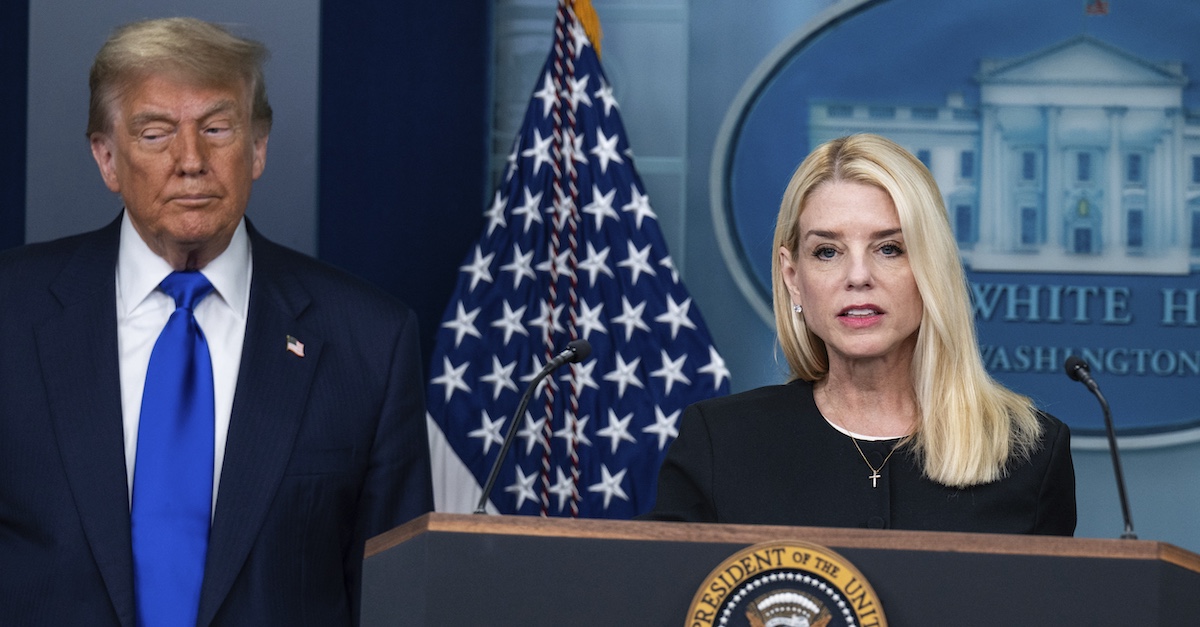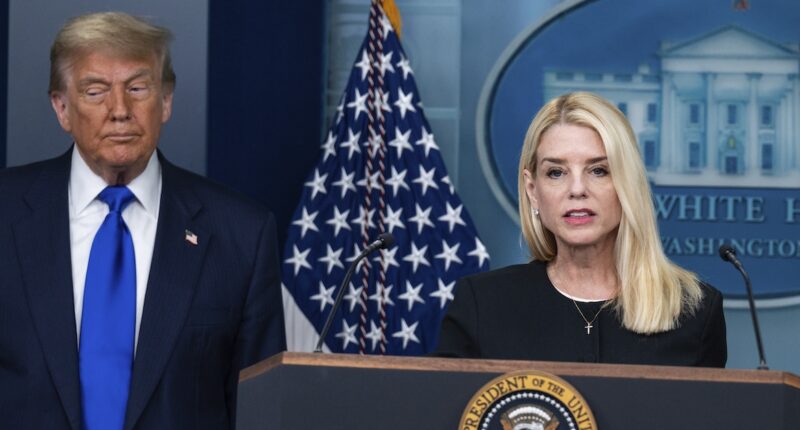
U.S. Attorney General Pam Bondi speaks at a press briefing with U.S. President Donald Trump in the James S. Brady Press Briefing Room in the White House in Washington, DC on Friday, June 27, 2025 (Photo by Annabelle Gordon/Sipa USA)(Sipa via AP Images).
A federal judge in Washington, D.C., was crystal clear on how he felt about the DOJ and its Office of Justice Programs” (OJP) “shameful” and “unfair” sweeping move to slash violence prevention and anti-human trafficking grants. But unfortunately for the groups who sued the Trump administration, the judge simultaneously acknowledged amid his lamentations that he was powerless to do anything about it.
A collection of safety-focused nonprofit grantees filed a class action suit against the DOJ and U.S. Attorney General Pam Bondi in May, claiming that the OJP’s April decision to “abruptly and summarily terminat[e] more than 370 multi-year cooperative agreements” and “$820 million in essential funding” ran afoul of the Fifth Amendment of the Constitution and the Administrative Procedure Act (APA).
The Vera Institute of Justice, the Children and Youth Justice Center, Chinese for Affirmative Action (aka Stop AAPI Hate), FORCE Detroit, and Health Resources in Action argued that the “no notice” terminations with “no reasoned explanation” amounted to a “quintessential unlawful agency action” in violation of the APA, one they contended that U.S. District Judge Amit Mehta had the power to stop.
On Monday, Mehta disagreed in rather straightforward fashion that he had any role to play, even as he roundly criticized the administration’s stated rationale for the cuts.
The judge said that because the plaintiffs’ APA claims against the government “are essentially contractual in nature” those claims “belong” in the U.S. Court of Federal Claims, not the U.S. District Court for the District of Columbia.
Love true crime? Sign up for our newsletter, The Law&Crime Docket, to get the latest real-life crime stories delivered right to your inbox
But while Mehta, a Barack Obama appointee, repeatedly noted he lacked jurisdiction to hear this case and tossed out the would-be class action suit, he did not waste an opportunity to condemn the Trump administration’s cuts and the justifications that were offered up for them.
“The Office of Justice Programs decision to terminate these awards was unquestionably arbitrary, at least in lay terms. The agency advised the grantees that it had ‘changed its priorities’ to focus on, among other things, ‘more directly supporting certain law enforcement operations,’ ‘combatting violent crime,’ and ‘supporting American victims of trafficking and sexual assault,'” the judge wrote. “The monies awarded to these Plaintiffs, however, were for those very purposes.”
Mehta next spelled out what the nonprofits were using the grant money to do:
Lead Plaintiff Vera Institute for Justice used one of its awards to train law enforcement on investigating human trafficking of persons with disabilities. Plaintiff Children and Youth Justice Center received funds to prevent and reduce gun violence against youth in King County, Washington. Plaintiff FORCE Detroit put its grant towards community violence intervention in Detroit’s Warrendale-Cody Rouge neighborhood. Plaintiff Heath Resources in Action used its funding to support violence prevention professionals and programs. And Plaintiff Chinese for Affirmative Action, which does business as Stop AAPI Hate, dedicated its grant towards, among other things, increasing safety on public transit systems.
Likening the DOJ’s explanation to a shrugging of the shoulders, Mehta then ratcheted up his criticism of the government, saying the cuts were “shameful” and “likely” to cause harm to the “vulnerable” in society.
“When asked at oral argument why these awards were no longer consistent with the agency’s new priorities, Defendants’ counsel had no answer. He simply shrugged his shoulders,” the judge continued. “Defendants’ rescinding of these awards is shameful. It is likely to harm communities and individuals vulnerable to crime and violence. No federal agency, especially the Department of Justice, should conduct itself in such manner.”
Mehta, after pointing out that “displeasure and sympathy are not enough in a court of law” and lamenting the limits of his power, ultimately declined to right what he viewed as an “injustice.”
“There is no doubt in the court’s mind that OJP’s award terminations were unfair and indiscriminate. When a government agency, especially the Department of Justice, agrees to fund private organizations to carry out a public purpose, such organizations expect regularity and respectful treatment,” he wrote. “That is not what occurred here.”
“The court laments that the limits of its own power prevent it from helping Plaintiffs and similarly situated grantees,” the judge added. “But the court cannot cure an injustice by exceeding its own authority.”
Read the full opinion here.








